- Home
- Steven Brust
Five Hundred Years After (Phoenix Guards) Page 50
Five Hundred Years After (Phoenix Guards) Read online
Page 50
In the second place, we beg any of our readers who may be annoyed to remember that we have, in fact, been forecasting exactly this occurrence; beginning with Khaavren’s first conversation with the pastry-vendor, who discussed the effect of the wheat-tax on the citizens, to his latest discussion with this same pastry-vendor, who spoke of the collapse of his hopes in terms that Khaavren, at least, understood to be symbolic of the collapse of the world around him.
These, then, are our excuses, should the reader feel himself to have been misled. As for those who were involved in the Five Hour Uprising, either attempting to quell it or adding fuel, as it were, to the fire, no one was as befuddled as the participants; which circumstance is, in fact, inevitable. There are some historians who, even today, lay the blame at the feet of the short-lived leaders; yet according to all of the evidence, these leaders, as amazed as anyone, were catapulted to the top of the Uprising as it progressed, because, like Plumtree, they expressed themselves in public a little better than their compatriots; or, like Tibrock, they had been expressing themselves in writing and were thus in the public eye; or, like Hithaguard, they made one or two suggestions that were well-received by their fellows and thus were called upon to make more. Certainly, none of the leaders had planned on such an Uprising, or, indeed, had the least idea of where it ought to go; it had, as it were, its own mind, and there was little anyone could do once it had been set on its destructive, and ultimately futile course. To lay the blame on such “leaders” as these is to blind one’s self to the logic of the Uprising.
What was the logic of the Uprising? Or, if the reader prefers, who was actually to blame? Pleasant as it might be, for the value of surprise if for no other reason, to lay the blame at anyone’s feet but Tortaalik’s, it is difficult to do so. That is, though others may have erred, certainly it was His Majesty’s failure to address the problems of the very city in which he lived that was the direct cause of the people’s exasperation. And yet, one might fairly ask: What could he have done? It is an inarguable fact that, with every day that passed, wheat became scarcer. To replace the wheat with rice from the South would have meant unblocking the harbor and providing the pirates of Elde Island with choice targets upon which to practice their trade; and, even if the Orca had taken it upon itself to rid the seas of these pirates, the cost in transport of the rice would have been greater even than the wheat; all of which does not even consider whether the populace would have been willing to substitute rice patties for bread, a proposition the historian finds dubious at best.
The price of wheat is, then, as much a culprit as anything, and for this we can lay the blame on—the weather, for had the drought broken, the prices of wheat, flax, maize, harbrand, and lockbean would necessarily have fallen. But, then, why was not the end of the drought brought about by sorcery, as even then lay within the skills of wizards of the House of the Athyra? And here, once more, we are forced to conclude that His Majesty erred—erred in remaining ignorant too long, erred in requesting rather than requiring the Athyra to address the problem, and finally, erred in placing so much import on the Imperial Treasury that he allowed the Athyra, the Dragon, and the Dzur to intimidate him into requesting, rather than requiring, action which he ought to have known was necessary.
In any event, however, the people of the city began to fear that they were abandoned; that their daily bread was, more than threatened, actually denied to them. As their fear grew, so did the degree to which they listened to the least rumor which offered a hope, or a hero, or, failing these, at least a culprit. Aliera’s action at the bakery had provided a hope; the rumors of Her Majesty siding with the greedy merchants to artificially raise prices (which was never true) provided a culprit. The rebel Prince, through his grievances, in point of fact, had little to do with the danger of famine in the city, became another hero. And thus when rumors abounded that the Emperor was sending the Imperial Army against him, the Emperor became another culprit.
The day before the Uprising—that is, the 16th day of the Month of the Vallista, matters reached a certain height; it was impossible to walk half a league anywhere in the city without seeing someone on a street corner declaiming loudly, and publicly, against His Majesty, against Her Majesty, against Jurabin, and against the Guard, who arrested those who so declaimed, which arrests became fresh grievances. Some, frightened by these demonstrations, left the city that day; others left for fear of Adron, whom they were afraid might, in his justified (so they thought) wrath against His Majesty, slaughter every citizen without regard for politics (indeed, among those who stayed, many put up placards with crude drawings of Adron’s seal, hoping to convince his supposed hundreds of thousands of troops to leave them in peace, and it was these placards, as much as anything else, which drove the fatigued and harassed Baroness Stonemover to such harsh measures against the least sign of disloyalty); still others left out of vague, ill-formed notions that all was not right in the city and would only get worse.
These last were, we must insist, exactly right, as the events of the 17th proved, although, in two different ways, it was that very panic that indirectly provided what Grita had called “the spark,” as we now propose to demonstrate.
In the first place, with such a sizable portion of the population gone (and estimates have ranged as high as ten out of every hundred citizens), undisciplined youth, especially Teckla, felt free to roam the streets and engage in mischief in a way they would never have dared if the population had not been so diminished.
And in the second, the final impetus that exasperated the population beyond endurance was the closing of the gates of the city before dawn on the 17th. To be sure, there was no other choice—Rollondar knew what he had to work with, and knew the speed of the Breath of Fire Battalion—by leaving any gate open except that within which his army assembled was to invite the Prince to attack the Imperial Army’s flank. But, to the people, this was not seen as a military maneuver, but, rather, as a petty, tyrannical gesture intended to prevent them from leaving the city where they faced conditions of starvation and repression. Does the reader wonder that they reacted to this development with either rage or panic—which two reactions, we should say, were indistinguishable by dawn? Here, again, we find the curious inevitability which seems to have followed the Uprising from its beginning to its tragic conclusion.
Does the reader wish to know details of the Uprising? Does the reader wish to know how much of Dragaera burned that day? Which buildings were looted? Whose home was invaded, and what became of the dwellers therein? In fact, there were not as many incidents of this type, nor were they as destructive, as many believe; certainly any institution representing the Empire in any way was attacked, and many counting-houses looted and burned; and of course some areas of the Palace, especially the Jhegaala Wing with its long exposed neck, and the isolated pagodas that formed part of the Yendi Wing, were burned and battered. But for the most part, it was the worst portions of the city, such as the Underside, which both provided the berserkers and took most of the damage.
In all, the Five Hour Uprising went through most of the stages of a normal uprising in a compressed time—the sudden, uncontrolled riot, the rising of leaders, the refusal of the Empire to treat with those leaders, the consolidation of the insurgents and their leaders into what Lord Mikric has termed an “alternate Imperium”—a second, but almost equally effective ruling body, which took as its home, instead of the Imperial Palace, the short, elegant, and practical Pamlar University Administration Building—a fact which some historians have attempted to make symbolic. The Uprising, we should add, was spared the inevitable quarrels over power and policy that accompany success, just as it was spared the inevitable executions and repressions that accompany failure; yet, for all of that, it was a full-scale uprising, complete in nearly every detail and carried through in just under five hours.
We have said this to be certain that the reader has some understanding of the situation in which those we have been following throughout our history found
themselves—the background, if we may, against which our history is painted. The precise details of this Uprising, as we hope we have shown, are an endless source of fascination and speculation, but we have no intention of actually spending the reader’s time on any of it beyond this point—in other words, it is only to the degree to which the Five Hour Uprising has an effect on our history that we have chosen to introduce and give a brief synopsis of its life and death.
For our purposes, then, it is sufficient to say that, as the light of day grew on the morning of the 17th a haze of smoke was already beginning to form over the city. It was beneath this haze, in the first hours of dawn, that Mario made his way once more to the Imperial Wing of the Palace. This time his methods were different—faster, less elegant, but just as effective. It is not hard to imagine where he found one of the uniform cloaks of the Phoenix Guard—he removed it from a corpse. Whether he found the corpse or whether, if the reader will permit, he created the corpse, we cannot know, but certainly with a few dabs of dirt cleverly applied to his face to both conceal his identity and make his features appear more Dragon-like, and with the uniform cloak of the White Sash Battalion, he had no difficulty presenting himself as a guardsman just come from facing the angry rabble; and when he claimed to have an urgent message from Baroness Stonemover to His Majesty, he was treated with every courtesy, and asked, moreover, if the message could not wait until the Palace was open, some two hours hence.
“How,” said Mario, pretending dismay, “two hours? And yet I am told the message is urgent.”
“Well,” said a well-meaning guardsman, “you must convince me it is urgent enough to disturb His Majesty, who is only now rising from his bed.”
“That decision,” said Mario, “I am loath to make. But come, perhaps I can explain to Lord Khaavren; surely he will be able to advise me.”
“He would,” agreed the guardsman, “but he is not here, nor will he be here today.”
“How, not here?” cried Mario, pretending surprise, although he had determined already that the Captain must, of necessity, be near to the battlefield. “But then, who is in charge of your corps?”
“Who else but Thack?”
“Well, and where do I find him?”
“Do you know the Sub-wing of the Red Boot Battalion?”
“Know it? I nearly think so. Is not my own brother married to a Redboot’s sister (although, come to that, I do not recall the guardsman’s name)? Nevertheless, I have been there on two occasions, and know it well.”
“And can you, without help, find your way to the sub-wing from here?”
“Well, I can indeed, for in my youth I ran messages from Jurabin to Khaavren, in hopes of learning the routes and paths, for, I freely confess, it was my hope to have your uniform, rather than that of a mere policeman.”
“Well,” said the guard, giving him a friendly smile. “Do not give up hope; who knows, it may be, after all of this is over, that the Captain and His Majesty will decide to expand the guard, and you may yet effect a transfer, and I will call you comrade.”
“Ah, ah! I promise you, nothing would make me happier.”
“Well, until then, if you know the paths, you need but take them, and ask after Thack.”
“I will do so. But might it be that I cannot find him?”
“That is true, for his duty takes him about the Palace, and he must perform His Majesty’s rounds this morning, as the Captain is away.”
“Well, but then?”
“Bah! You are a good sort; if you cannot find him, seek him in the Imperial Wing.”
“I will not fail to do so. And yet—”
“Well?”
“Is it not true that I will need a safe-conduct to pass through the halls?”
“Not in the least, unless you venture into the Imperial Wing itself.”
“But might my errand not take me there, as you have just said?”
“Well, that is true. Here, take mine, only promise to return it to me when your business is completed.”
“I will not fail to do so; and yet, between looking for Thack, and awaiting His Majesty, it may be some time.”
“Well, what of it? I am on duty until the first hour after noon.”
“Shards and splinters! A long watch!”
“It is the day for it.”
“That is the truth; I have only just barely escaped with my life from a crowd of ruffians, and the day promises to become warmer before it cools. In truth, I confess I was not sorry to be given this errand, if only to be for two minutes off the streets, which is to say, off the front lines of battle!”
“Given the errand?” said the guard with a conspiratorial smile. “Come, the truth now: Did you not, in fact, request the errand?”
“Ah, well, I don’t say that I didn’t. But come, consider: There are monsters out there; they hate the uniform and they do not know rules of combat, but attack in any numbers and with whatever comes to hand. In all honesty, do you blame me?”
“Not the least in the world, I assure you, and to prove it, here is your safe-conduct.”
“You are a good fellow!”
“Allow me to pin it on your cloak.”
“Very good.”
“There it is.”
“I thank you.”
“Good luck on your errand.”
“And the Favor to you; I will see you when my errand is complete.”
With this, Mario gave a humble bow, turned, and walked past the guard post, down a short corridor toward the Dragon Wing, through which he continued coolly, as if having no fear of being recognized, and, from there, he came to the lorich Wing, his first destination. There he asked after Guinn, the jailer, who happened to be present.
“Greetings,” he said. “We shall be bringing a good number of citizens to their new homes here.”
“Well,” said Guinn. “We can accommodate them.”
“Are you certain? For, you perceive, the Baroness insists the we ascertain how much room you have before we bring them in.”
“Well, to be sure, we cannot contain them all. But should they be common citizens, we can certainly take another two or three score.”
“And noblemen, by which I mean a count?”
“Another four or five will present us with no difficulty.”
“Excellent. But, forgive me, what of the accommodations? We are dealing with matters of High Treason by an aristocrat, and thus we must be certain, on the one hand, that the cell is secure, and, on the other, that no disrespect is shown by treating the prisoner as if he were common.”
“Well, I understand, and, I assure you, this is a matter upon which we pride ourselves. Come, if you like; we happen to have a prisoner now, a certain Dragonlord who has been arrested for High Treason exactly, and, if you like, we will visit her, and you will see for yourself what the accommodations will be like for those with whom the Baroness chooses to honor us.”
“How, you have such a person here?”
“Indeed, we do.”
“And convicted on a charge of High Treason?”
“Oh, no, not at all.”
“Pardon me, good Guinn?”
“Arrested only; there are other quarters for those who are convicted, where they are shown every possible comfort while awaiting execution. Yet the chambers for those who are merely awaiting trial on such charges are, while entirely secure, perfectly comfortable, so that, however nice an aristocrat’s sensibilities, he shall have nothing of which to complain.”
“I think the Baroness will be pleased, if the arrangements are as good as you say.”
“Let us then go and look,” said Guinn.
“I should like nothing better,” said Mario calmly.
It was, by the this time, ten minutes after the seventh hour of the morning.
A few minutes later, Khaavren, Aerich, Tazendra, and Pel left the house, and began making their way toward the Dragon Gate, which was not far away. It was, in fact, so close that they soon realized that they would have to fight
their way through ranks of infantry to reach it.
“Bah!” said Tazendra. “There must be another way.”
“There may be,” said Pel, stopping as if to recall something.
“Indeed?” said Khaavren doubtfully. “I do not know another way.”
“I did not either, but I have recently heard that, if one takes the Toehold Bridge from the Paved Road, one arrives at the Gate of the Seven Flags, which is, as you know, not far from the Dragon Gate.”
“Ah,” said Khaavren, considering. “That may be true; I had not known of it.”
“But,” said Tazendra, frowning. “Will not the Gate of the Seven Flags be closed?”
“Khaavren is Captain of the Guard,” said Pel gently.
“So he is,” said Tazendra in wonder. “I had forgotten that circumstance.”
“Well, what do you think, Khaavren?” said Pel.
“I do not know,” said Khaavren. “Let us, at any rate, attempt it.”
“Certainly,” said Tazendra, “if it allows us any more room.”
“Indeed,” said Khaavren; “we could even risk horses on the paved road, and perhaps all the way to the gate.”
“Let us then do so,” said Aerich calmly. “For I believe there is no time to spare.”
They at once ran to the Hammerhead Inn, where horses were always stabled. Khaavren suggested the others see to equipping the horses, while he, Khaavren, arranged matters with the landlord. They at once agreed to this plan, and Khaavren entered the inn.
“Greetings, Tukko, old friend,” he said.

 Phoenix
Phoenix Tiassa
Tiassa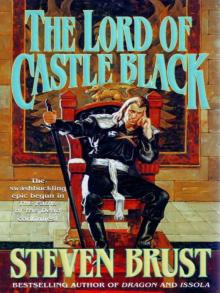 The Lord of Castle Black
The Lord of Castle Black To Reign in Hell: A Novel
To Reign in Hell: A Novel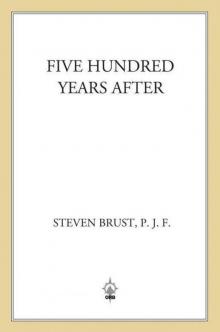 Five Hundred Years After (Phoenix Guards)
Five Hundred Years After (Phoenix Guards)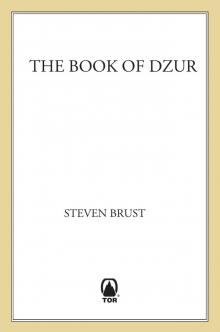 The Book of Dzur: Dzur ; Jhegaala
The Book of Dzur: Dzur ; Jhegaala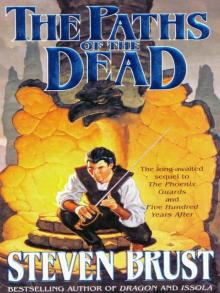 The Paths of the Dead
The Paths of the Dead Jhegaala
Jhegaala The Desecrator: A Tor.com Original
The Desecrator: A Tor.com Original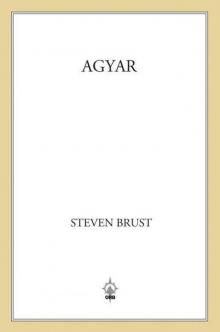 Agyar
Agyar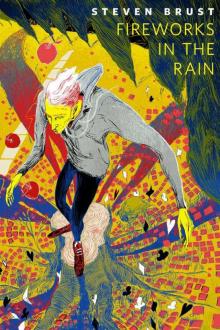 Fireworks in the Rain
Fireworks in the Rain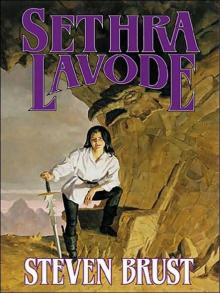 Sethra Lavode
Sethra Lavode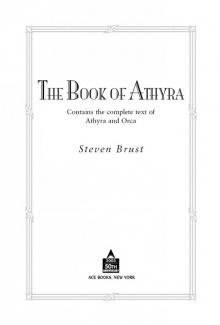 The Book of Athyra
The Book of Athyra Yendi
Yendi Good Guys
Good Guys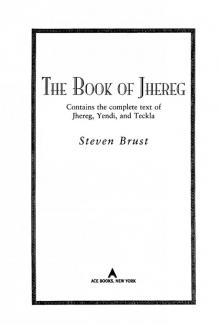 The Book of Jhereg
The Book of Jhereg Cowboy Feng's Space Bar and Grille
Cowboy Feng's Space Bar and Grille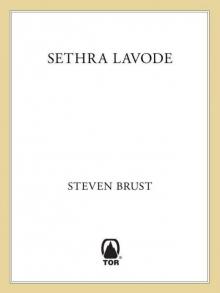 Sethra Lavode (Viscount of Adrilankha)
Sethra Lavode (Viscount of Adrilankha) My Own Kind of Freedom
My Own Kind of Freedom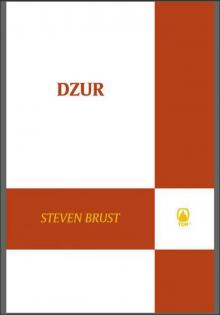 Dzur (Vlad Taltos)
Dzur (Vlad Taltos) The Lord of Castle Black: Book Two of the Viscount of Adrilankha
The Lord of Castle Black: Book Two of the Viscount of Adrilankha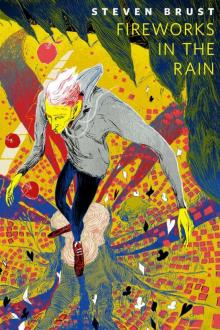 Fireworks in the Rain: A Tor.Com Original
Fireworks in the Rain: A Tor.Com Original To Reign In Hell
To Reign In Hell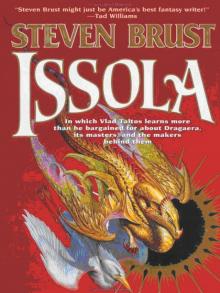 Issola
Issola Orca
Orca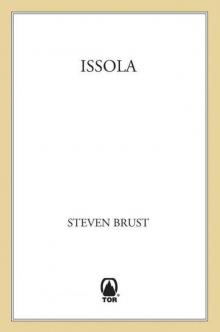 Issola (Vlad Taltos)
Issola (Vlad Taltos)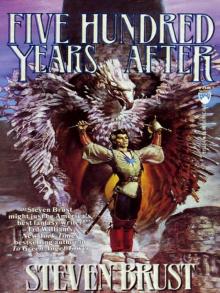 Five Hundred Years After
Five Hundred Years After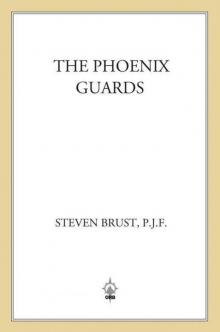 The Phoenix Guards
The Phoenix Guards Taltos
Taltos![[Vlad Taltos 06] Athyra Read online](http://i1.bookreadfree.com/i1/03/24/[vlad_taltos_06]_athyra_preview.jpg) [Vlad Taltos 06] Athyra
[Vlad Taltos 06] Athyra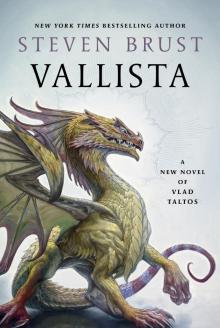 Vallista--A Novel of Vlad Taltos
Vallista--A Novel of Vlad Taltos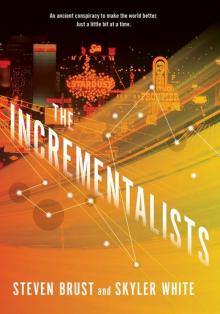 The Incrementalists
The Incrementalists![[Vlad Taltos 04] Taltos Read online](http://i1.bookreadfree.com/i/03/24/[vlad_taltos_04]_taltos_preview.jpg) [Vlad Taltos 04] Taltos
[Vlad Taltos 04] Taltos![[Vlad Taltos 03] Teckla (v 1.1) Read online](http://i1.bookreadfree.com/i1/03/27/[vlad_taltos_03]_teckla_v_1_1_preview.jpg) [Vlad Taltos 03] Teckla (v 1.1)
[Vlad Taltos 03] Teckla (v 1.1)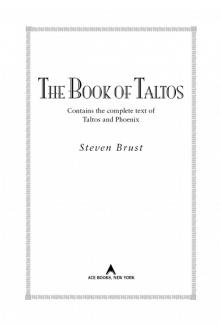 The Book of Taltos
The Book of Taltos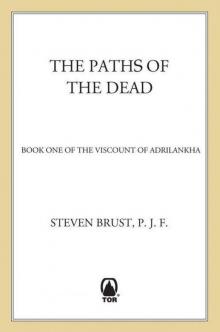 The Paths of the Dead (Viscount of Adrilankha)
The Paths of the Dead (Viscount of Adrilankha) Jhegaala (Vlad Taltos)
Jhegaala (Vlad Taltos)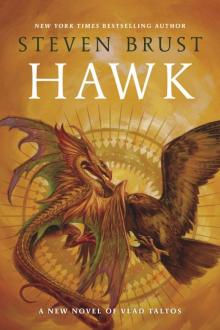 Hawk (Vlad)
Hawk (Vlad) Iorich
Iorich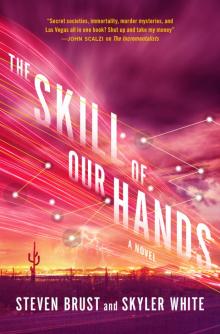 The Skill of Our Hands--A Novel
The Skill of Our Hands--A Novel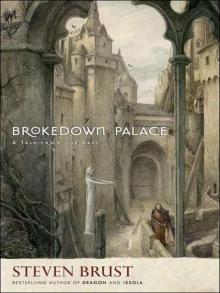 Brokedown Palace
Brokedown Palace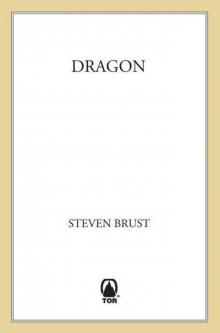 Dragon (Vlad Taltos)
Dragon (Vlad Taltos) Dragon
Dragon Athyra
Athyra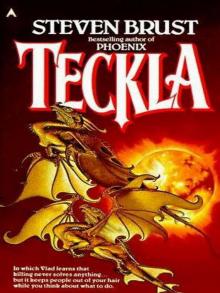 Teckla
Teckla Dzur
Dzur